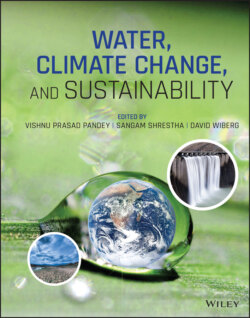Читать книгу Water, Climate Change, and Sustainability - Группа авторов - Страница 36
3.1.1. Bio‐Based Systems for Achieving the Sustainable Development Goals
ОглавлениеOne of the challenges of the twenty‐first century and beyond is the development of secure and sustainable sources of energy, and supply of clean water and food for the exponentially growing world population (Waskom et al., 2014). World primary energy consumption in 2015 was estimated as ~13.7 Billion Tons of Oil Equivalent (IEA, 2018). In addition, the world water use in the same year was estimated as ~ 4 trillion m3 (IGBP, 2015). Population growth creates shortage in energy, water and food supply. By 2050, compared to 2015, 80% more energy and 55% more water will be required to meet the increasing population demand (Waskom et al., 2014). The countries are responsible to facilitate the effective implementation of the Sustainable Development Goals (SDGs), set by the United Nations General Assembly (UNCTAD, 2014). Among the SDGs, those related to the conservation of the natural resources and environment are of high importance for reducing the risks of natural disasters and ensuring the resource security for future generations. Bio‐based systems play an important role in achieving the SDGs by: (i) sustainable management of water resources (SDG 6), (ii) sustainable development of energy resources (SDG 7), (iii) adopting the sustainable production and consumption concept (SDG 12), and (iv) developing the renewable energy sources for tackling climate change (SDG 13).
Figure 3.1 Carbon cycle of biofuels.
Substituting petroleum‐based fuels with biofuels allows the conservation of natural resources and mitigates greenhouse gas (GHG) emissions by reducing the environmental burdens associated with petroleum‐based fuels, thus contributing to the attainment of the SDGs. The supply of biofuels mitigates the environmental impacts due to the use of fossil fuels, because of carbon dioxide uptake by plants during the growing phase (Figure 3.1).
